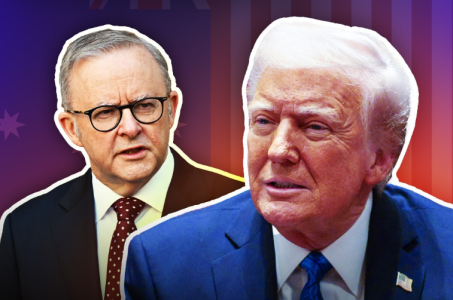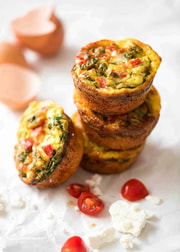Prime Minister extends peace-making gesture to Trump amid rising tensions
By
Gian T
- Replies 22
Navigating the choppy waters of international trade relations can be as complex as it is crucial, especially when tariffs come into play.
It's a dance of diplomacy that requires both tact and resilience.
Recently, Australian Prime Minister Anthony Albanese extended a diplomatic olive branch to US President Donald Trump in the wake of heightened tensions over tariffs on important resources.
Albanese, who has been steering Australia through these turbulent trade waters, expressed hope to visit the United States to discuss matters directly with President Trump.
In a gesture of goodwill, he also invited Trump to visit Australia, despite the fact that the US President had not made the trip during his first term.
The relationship between the two leaders has seen its fair share of strain, particularly after Albanese's unsuccessful attempts to reach Trump by phone last month.
The call was intended to secure an exemption for Australia from the increased tariffs, but unfortunately, it went unanswered.
During an interview on ABC's Afternoon Briefing, Albanese said, 'I have discussed with the president going to the US and I expect that certainly will be very early on in the term. I have also invited the President to Australia. He did not come in his first term as president, but American presidents will always be welcome here, just as other international visitors are.'
This diplomatic outreach comes after negotiations and representations that Albanese insists have been conducted in 'good faith' with the Trump administration.
Despite previous clashes over tariffs, the Australian government remains committed to an Australian defence policy that aligns with the Defence Strategic Review and the additional investment put forward.
Sky News host Peter Stefanovic questioned whether these efforts might provoke Trump, to which Albanese responded that Australia's interests are paramount.
'What we want... is an Australian defence policy consistent with the Defence Strategic Review that we've put forward and the additional investment that we have put forward from the one that we inherited,' he stated.
The Prime Minister remains hopeful about Trump's recent suggestion that he might reconsider some tariff threats.
'We're continuing to negotiate in good faith with the US Administration, make representations,' Albanese said. 'That's what responsible governments do.'
Albanese remains determined despite the challenges, including Trump's refusal to offer Australia an exemption to his hefty 25 per cent steel and aluminium tariffs.
He congratulated Trump on his November election win and has since tried to argue Australia's case for exemption from trade tariffs, which Trump said he would give 'great consideration.'
However, the situation remains precarious as the Trump administration will announce its next sector-specific tariffs soon.
In the past week, Trump has threatened tariffs on Australian wine and faced pressure from 'Big Pharma' over Australia's Pharmaceutical Benefits Scheme (PBS).
American drug companies have complained that the PBS cuts prices and blocks American exporters, potentially leading to tariffs on prescription medicines.
Despite these tensions, Eli Lilly chief executive David Ricks has publicly stated his opposition to tariffs on medications, saying, 'We do not support tariffs on medications anywhere, and we certainly wouldn't be excited to see a policy like that.'
As new US tariffs on Australian agricultural exports loom, set to take effect on 1 April, alongside new import taxes on Australian pharmaceutical exports, the need for a resolution becomes more urgent.
It's a delicate balance, considering the US has enjoyed a trade surplus with Australia since 1952, which seems to have been overlooked by the Trump Administration.
Albanese's diplomatic efforts reflect a commitment to maintaining strong international relationships and protecting Australia's economic interests.
As the Prime Minister continues to engage with the US through officials and the representations, the hope is that a mutually beneficial outcome can be reached, fostering cooperation rather than conflict.
In other news, the Barefoot Investor, Scott Pape, has expressed concerns that Australia could face a recession if President Donald Trump's proposed tariffs are implemented.
Trump's executive order imposes a 25 per cent tariff on aluminium and steel imports, potentially escalating a trade war that could have significant global economic impacts. You can read more about it here.
Credit: Facebook
 How should Australia navigate its relationship with the US amidst these tariff tensions? Share your insights and opinions in the comments below.
How should Australia navigate its relationship with the US amidst these tariff tensions? Share your insights and opinions in the comments below.
It's a dance of diplomacy that requires both tact and resilience.
Recently, Australian Prime Minister Anthony Albanese extended a diplomatic olive branch to US President Donald Trump in the wake of heightened tensions over tariffs on important resources.
Albanese, who has been steering Australia through these turbulent trade waters, expressed hope to visit the United States to discuss matters directly with President Trump.
In a gesture of goodwill, he also invited Trump to visit Australia, despite the fact that the US President had not made the trip during his first term.
The relationship between the two leaders has seen its fair share of strain, particularly after Albanese's unsuccessful attempts to reach Trump by phone last month.
The call was intended to secure an exemption for Australia from the increased tariffs, but unfortunately, it went unanswered.
During an interview on ABC's Afternoon Briefing, Albanese said, 'I have discussed with the president going to the US and I expect that certainly will be very early on in the term. I have also invited the President to Australia. He did not come in his first term as president, but American presidents will always be welcome here, just as other international visitors are.'
This diplomatic outreach comes after negotiations and representations that Albanese insists have been conducted in 'good faith' with the Trump administration.
Despite previous clashes over tariffs, the Australian government remains committed to an Australian defence policy that aligns with the Defence Strategic Review and the additional investment put forward.
Sky News host Peter Stefanovic questioned whether these efforts might provoke Trump, to which Albanese responded that Australia's interests are paramount.
'What we want... is an Australian defence policy consistent with the Defence Strategic Review that we've put forward and the additional investment that we have put forward from the one that we inherited,' he stated.
The Prime Minister remains hopeful about Trump's recent suggestion that he might reconsider some tariff threats.
'We're continuing to negotiate in good faith with the US Administration, make representations,' Albanese said. 'That's what responsible governments do.'
Albanese remains determined despite the challenges, including Trump's refusal to offer Australia an exemption to his hefty 25 per cent steel and aluminium tariffs.
He congratulated Trump on his November election win and has since tried to argue Australia's case for exemption from trade tariffs, which Trump said he would give 'great consideration.'
However, the situation remains precarious as the Trump administration will announce its next sector-specific tariffs soon.
In the past week, Trump has threatened tariffs on Australian wine and faced pressure from 'Big Pharma' over Australia's Pharmaceutical Benefits Scheme (PBS).
American drug companies have complained that the PBS cuts prices and blocks American exporters, potentially leading to tariffs on prescription medicines.
Despite these tensions, Eli Lilly chief executive David Ricks has publicly stated his opposition to tariffs on medications, saying, 'We do not support tariffs on medications anywhere, and we certainly wouldn't be excited to see a policy like that.'
As new US tariffs on Australian agricultural exports loom, set to take effect on 1 April, alongside new import taxes on Australian pharmaceutical exports, the need for a resolution becomes more urgent.
It's a delicate balance, considering the US has enjoyed a trade surplus with Australia since 1952, which seems to have been overlooked by the Trump Administration.
Albanese's diplomatic efforts reflect a commitment to maintaining strong international relationships and protecting Australia's economic interests.
As the Prime Minister continues to engage with the US through officials and the representations, the hope is that a mutually beneficial outcome can be reached, fostering cooperation rather than conflict.
In other news, the Barefoot Investor, Scott Pape, has expressed concerns that Australia could face a recession if President Donald Trump's proposed tariffs are implemented.
Trump's executive order imposes a 25 per cent tariff on aluminium and steel imports, potentially escalating a trade war that could have significant global economic impacts. You can read more about it here.
Credit: Facebook
Key Takeaways
- Prime Minister Anthony Albanese has extended an olive branch to US President Donald Trump, expressing a willingness to visit the US and inviting Trump to Australia.
- The relationship between the two leaders has been strained due to disagreements over steel and aluminium tariffs.
- PM Albanese insists that his government has been negotiating in 'good faith' with the Trump administration despite the tensions.
- The Trump administration is considering new tariffs on Australian exports, but discussions continue in hopes of reaching an agreeable outcome.








